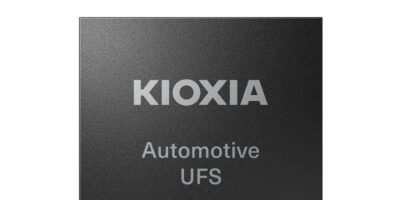Kioxia samples universal flash storage for automotive designs
Automotive universal flash storage (UFS) version 3.1 embedded flash memory devices have been introduced by Kioxia Europe. The UFS has a serial interface allowing it to support full duplexing, which enables both concurrent reading and writing between the host processor and UFS device.
The UFS memory devices are based on the company’s BiCS Flash 3D flash memory and are available in a range of capacities from 64 to 512Gbyte. They are, says the company, designed to support the requirements of evolving automotive applications for driver experiences.
Storage requirements for automotive applications continue to increase as infotainment systems and advanced driver assistance systems (ADAS) become more sophisticated, explained Axel Störmann, vice president Memory Marketing & Engineering, Kioxia Europe.
The latest UFS memories support a wide temperature range of -40 to +105 degrees C and meet AEC-Q100 Grade 2 requirements.
Both the sequential read and sequential write performance of the Automotive UFS Version 3.1 device are improved by approximately 2.2x and 6x, respectively, compared with the previous generation devices. These performance gains contribute to faster system start-up and OTA (over the air) updates, added Kioxia.
Sample shipments of the 256, 128 and 64Gbyte devices will start today, with the 512Gbyte devices to ship in April.
Read and write speeds are the best values obtained in a specific test environment at Kioxia. Read and write speeds may vary depending on the device used and file size read or written, cautioned the company.
Kioxia Europe (formerly Toshiba Memory Europe) is the European-based subsidiary of Kioxia, a supplier of flash memory and solid-state drives (SSDs). Kioxia can trace its expertise from the invention of flash memory to today’s breakthrough BiCS Flash. The company’s innovative 3D flash memory technology, BiCS Flash, is shaping the future of storage in high-density applications, including advanced smartphones, PCs, SSDs, automotive and data centres.




